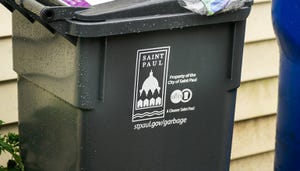Gone with the Wind?
April 1, 2007
Michael Fickes
Atlanta is the home of COCA-COLA a thriving hip-hop music recording industry and a Major League Baseball powerhouse. It's also where native Margaret Mitchell penned the legendary novel “Gone with the Wind,” and the Olympic Games celebrated their centenary. However, the city and its surrounding metro area now are arguably best known for the explosive growth the region has experienced during the past 20 years. In the past five years alone, the city's population has grown 14.3 percent, reaching 500,000 in 2006.
If you are one of the thousands of industry professionals attending WasteExpo this year, you are among the half million workers, conferees and tourists that visit Atlanta every day, swelling the head count to more than 1 million.
Surprisingly, all that growth and all those visitors have failed to increase the number of tons of solid waste collected annually in Atlanta. According to the city's Department of Public Works (DPW), which houses the Office of Solid Waste Services (OSWS), Atlanta's residential and institutional solid waste streams have held steady at 150,000 tons per year and 750 tons per year, respectively, for the last several years. Recycling collections have inched up to 7,000 tons per year, and green waste collection brings in 30,000 tons per year. (Private contractors haul Atlanta's commercial trash, and the city does not tally commercial tons collected.)
While the city continues to welcome more residents, officials want to create an opposite dynamic when it comes to solid waste. Atlanta is pushing hard to increase recycling and to drive down annual solid waste tonnage and costs. The city's ultimate goal: zero waste — total landfill diversion — for its residential and institutional trash streams.
“The mayor (Shirley Franklin) has challenged us to get to zero waste within 50 years,” says DPW Commissioner David E. Scott. “All our programs have been geared to reduce residential and institutional tonnage to zero.”
The Role of Recycling
The zero-waste goal arose two years ago when the city revamped its solid waste management plan and also outlined methods for achieving the mark. “One of the most important of those strategies is recycling,” Scott says.
Atlanta has developed a massive three-prong plan to increase recycling everywhere in the city. First, Atlanta officials are moving to create markets for recycled commodities by encouraging area businesses to buy and use the materials. Second, the city is developing pilot programs designed to increase recycling among residents. And third, officials have begun to engage the commercial community about the importance of recycling.
“We are trying to develop reliable regional markets for recycling commodities,” Scott says. “Right now, for example, companies in our region pay to ship in paper from outside the region. If we create a paper supply here by recycling paper, we are reducing our waste stream and cutting transportation costs, because companies here won't have to ship as many products in.”
In addition to paper, the market-building efforts will cover plastics, metals, wood and glass.
Atlanta currently contracts with locally-based Dreamsan to provide recycling collection and processing services. Dreamsan collects single-stream residential recyclables in 18-gallon cans on the same days that Atlanta solid waste workers collect residential waste. The firm's material recovery facility (MRF) includes a high capacity in-feed hopper, 36-inch wide in-feed and sorting belts, a disc screen, a plastic perforator, an overhead belt magnet and an air sorter. The 66,000-square-foot MRF can process 100 tons of recyclable materials per day.
To boost recycling among residents, the city is experimenting with a number of ideas. “We're going to attach RFID [radio frequency identification] tags to recycling containers,” says James Swope, the city's public works manager. “Readers on the trucks will scan the tags and monitor participation. Incentives could be coupons from local businesses or other kinds of awards. We're still working this out. Once the plan is finalized, we will pilot test it with 10,000 customers.”
The incentive idea arose during discussions with Atlanta Recycling, a group that includes the city and a number of nationally and internationally known companies based in Atlanta. “We have worked with the Turner Foundation, Coca-Cola and other groups on many recycling initiatives,” says Donna Owens, deputy commissioner of solid waste services. “Other ideas that our discussions have produced include a program to increase recycling in city buildings and at [Hartsfield-Jackson International] Airport. We're also developing ideas to boost recycling at sporting events. These might involve replacing trash bins with recycling bins and requesting that suppliers use specific packaging material to simplify sorting.”
Owens adds that her office also has placed recycling receptacles at fire stations and police stations across town.
While the city has no direct control over commercial solid waste, it has begun to urge businesses to recycle. “We have identified construction and demolition materials as a large portion of the commercial waste stream — about 25 percent is recoverable concrete, steel, wood and other materials,” Scott says.
Paying for Recycling
To support Atlanta's recycling initiative, public works and solid waste officials are eyeing ways to trim the costs of conventional hauling operations.
OSWS will request a budget of $53 million in 2008. Some of that money has been earmarked for cost-cutting technology. “We want to install onboard computers and GPS tracking systems,” Owens says. “We want our crews to begin reporting on conditions in the field while they are there.”
In addition, Owens wants to use the GPS system to begin to automate routing, which is now done manually.
DPW also has beefed up its equipment maintenance routine, with the goal of keeping the trucks on the road. The Office of Motor Transport Services, which is part of DPW, oversees vehicle maintenance.
While drivers and laborers carry out pre- and post-trip inspections, mechanics at the OSWS truck yards now make pre-trip repairs as well as regular maintenance repairs. As a result, the availability of fully operational equipment has improved.
Atlanta also cut its yard trimming disposal costs in half this year. Georgia requires that yard trimmings be collected and disposed of separately from solid waste. That has become expensive. Atlanta collects 30,000 to 40,000 tons of yard trimmings per year, disposing of the material at regional compost facilities. Tipping fees for green waste currently rose to $30 per ton last year and are projected to increase to $40 per ton in the near future.
“As a result of rising disposal costs, we looked for and found a disposal alternative last year,” Swope says. “We began processing green waste into fuel for local mills and manufacturing plants.”
According to Swope, the cost of processing yard trimmings into usable fuel totals only half as much as tipping at compost facilities. “The idea has not only cut our costs in half, it has also helped local industry to use less fossil fuel,” he says.
Moving Facilities
Atlanta also has undertaken an initiative that will eventually relocate its solid waste facilities more efficiently to city neighborhoods. In some instances, solid waste facilities have been located in the same place for as long as 30 years, Scott says. During that time, the city has evolved and grown. Now comes the challenging task of fitting facilities into new commercial and residential communities.
In planning relocations, Scott has been thinking about how the post office locates its low profile facilities in communities. Post office locations usually have stores where residents can purchase stamps and other supplies. They also have mailboxes where residents can drop off mail. And, of course, many locations have parking lots for trucks.
“We're absolutely serious about the analogy,” Scott says. “We're envisioning facilities that serve their communities with things like recycling drop-off stations. If we want people to recycle, we have to make it convenient to where they live and work.”
Scott and his solid waste team are considering designing a number of convenience centers for different communities in Atlanta. Each would provide services tailored to community needs. One might offer yard waste and recycling drop-off services. Another might offer drop-off facilities for hazardous household wastes.
Over the past two years, OSWS has hosted 30 community meetings across the city to engage residents in the process of planning relocations.
Commissioner Scott views Atlanta's recycling and other solid waste initiatives in a larger context: “Atlanta is growing by leaps and bounds,” he says. “As a result, we have to change our concept of solid waste disposal. The decisions that we make today will set the course years into the future. We have to begin thinking of ourselves as caretakers of the Earth. In that light, a goal of zero waste in 50 years is important and realistic, especially if we work toward that goal as a community.”
Michael Fickes is a contributing writer based in Cockeysville, Md.
WELCOME TO Metro Atlanta
Atlanta itself is home to about 500,000 people. The city and the surrounding area combine to create the ninth-largest metropolitan area in the country. Approximately 4.9 million people live in metro Atlanta.
SOURCE: U.S. CENSUS BUREAU
ATLANTA SOLID WASTE AT A GLANCE
Atlanta collects 150,000 tons of residential solid waste per year, along with 750 tons of solid waste from institutional and public buildings. Private contractors collect commercial solid waste.
The city contracts with Atlanta-based Dreamsan to collect residential recyclables. The firm gathers about 7,000 tons of recyclables per year through single-stream collection services.
Two privately owned transfer stations accept waste collected by the city and send it to landfills in Ball Ground, Ga., and Griffin, Ga., both of which are about 50 miles from Atlanta.
Atlanta's solid waste fleet consists of 147 pieces of heavy equipment, including 70 semi-automated rear loaders, 11 mini-packers, nine knuckle booms, 12 rubber tire loaders, six dump trucks, and 11 front loaders. The remaining equipment includes roll offs, street sweepers, and open body crew cabs. Crane Carrier supplies the truck chasses, while Leach supplies the bodies.
Atlanta's Office of Solid Waste Services has achieved a 99.8 percent on-time collection rate.
SOURCE: ATLANTA OFFICE OF SOLID WASTE SERVICES
IMPROVING SAFETY
Atlanta's Office of Solid Waste Services (OSWS) employs six safety officers and a safety committee as part of a labor-management partnership. The officers and the committee monitor and promote safe waste collection and handling. As a result of their efforts, the OSWS reduced the number of employee injuries by 11 percent from 2005 to 2006. During the same period, the number of workers' compensation claims declined by 66 percent and workdays lost due to injury decreased by 77 percent.
You May Also Like


